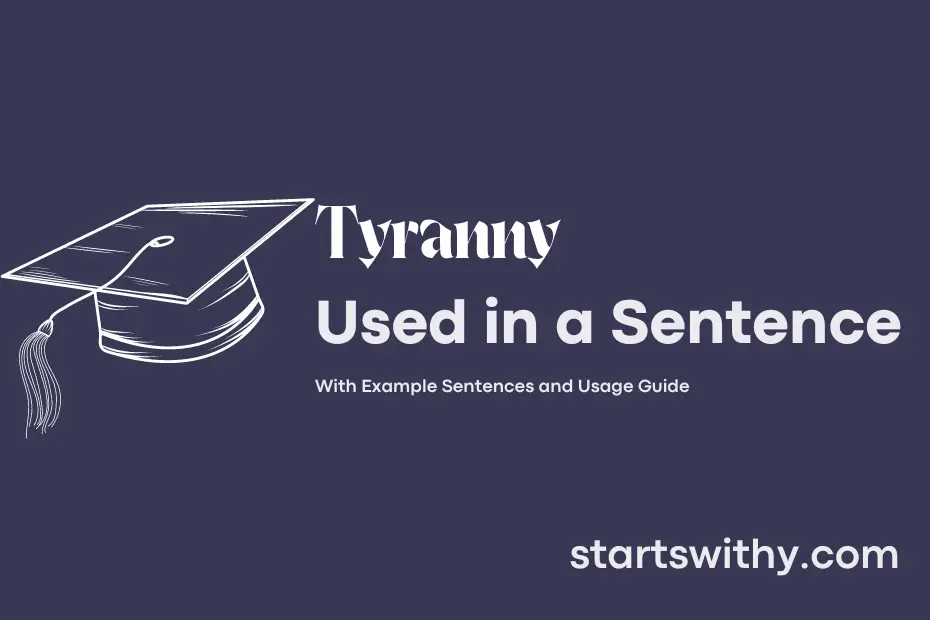Tyranny refers to the oppressive or unjust exercise of power, often associated with a dictator or authoritarian regime. It involves the use of authority and control to suppress individual rights and freedoms.
Instances of tyranny can be found throughout history in various forms, from limiting free speech to employing harsh punishments for dissent. Understanding tyranny is crucial in recognizing and combatting its detrimental effects on society.
7 Examples Of Tyranny Used In a Sentence For Kids
- The king’s cruel tyranny made the people sad.
- We should stand up against tyranny and fight for our rights.
- Tyranny is when someone uses too much power over others.
- Let’s work together to stop the evil tyranny in our land.
- Kindness and love can defeat the darkness of tyranny.
- It’s important to treat everyone with respect and not to impose tyranny on others.
- We must teach our children about the importance of freedom and standing up against tyranny.
14 Sentences with Tyranny Examples
- Students in India often face tyranny from strict professors who enforce rigid rules in the classroom.
- The tyranny of excessive assignments and exams can sometimes lead to burnout among college students.
- Group projects can sometimes result in power struggles and tyranny among team members.
- Students may rebel against the tyranny of strict dress codes and uniform policies on campus.
- The tyranny of peer pressure can influence students to make choices that go against their values.
- Campus authorities may impose tyranny by restricting access to certain areas of the university.
- The tyranny of high tuition fees can prevent some students from pursuing higher education.
- Some students may experience tyranny from academic advisors who push them to choose a major they are not interested in.
- The tyranny of strict deadlines can cause stress and anxiety among college students.
- The tyranny of social media expectations can lead to unhealthy comparisons and self-doubt among students.
- Student government elections can sometimes be marred by accusations of tyranny and unfair practices.
- The tyranny of limited resources can hinder students from fully engaging in extracurricular activities.
- Eager students may challenge the tyranny of outdated curriculum and push for modernization in education.
- The tyranny of bureaucracy in the college administration can make it difficult for students to navigate policies and procedures.
How To Use Tyranny in Sentences?
Tyranny is the oppressive or unjust use of power. When using this word in a sentence, it is important to provide context to help others understand its meaning. For example, “The citizens of the kingdom rebelled against the tyranny of the cruel ruler.” In this sentence, tyranny is used to describe the oppressive rule of the ruler.
When using tyranny, it is helpful to provide specific examples or details to illustrate the nature of the oppressive behavior. For instance, “Under the tyranny of the dictatorship, freedom of speech was severely restricted.” This sentence conveys how tyranny can manifest in limiting people’s rights and freedoms.
Additionally, it is essential to use tyranny in a way that accurately reflects its meaning. Avoid using it casually or in a flippant manner, as tyranny conveys a serious and negative connotation.
As you incorporate tyranny into your writing or conversations, consider the impact of the word and the gravity of the situation it describes. By using tyranny thoughtfully and accurately, you can effectively communicate instances of abuse of power or unjust rule.
Conclusion
In various historical and fictional examples, sentences with the keyword “tyranny” illustrate the oppressive and unjust exercise of power over others. These sentences often depict the imposition of harsh and cruel rule, where individuals or groups are subject to domination and control, leading to suffering and subjugation. Through these examples, the negative consequences of tyranny become apparent, highlighting the importance of promoting freedom, equality, and justice in society.
Ultimately, sentences with the keyword “tyranny” serve as a reminder of the dangers of unchecked power and the need to resist authoritarianism in all its forms. By recognizing and challenging oppressive systems, individuals can strive to uphold democratic principles, protect human rights, and create a more equitable and just world for all.



